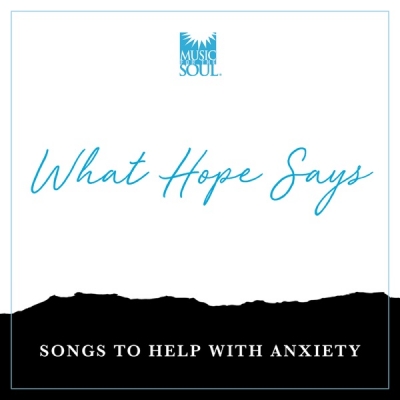Music for the Soul's 'What Hope Says' Addresses the Rise in Anxiety Disorders
Music for the Soul, a non-profit organization endorsed by the American Association of Christian Counselors, announces the release of their latest musical project, "What Hope Says." This new recording project aims to provide solace and hope to those struggling with anxiety, a condition that has seen a significant rise in recent years.
According to the Anxiety and Depression Association of America, anxiety disorders affect 40 million adults in the United States every year, making it the most common mental illness in the country. The pandemic, social media pressures, and political polarization have only exacerbated these numbers, leading to a mental health crisis that demands attention.
"All our consulting therapists told us that anxiety was the thing they were hearing about the most from their clients,†says Steve Siler, founder of Music for the Soul. “I worked with songwriters Scott Krippayne and Tony Wood to undertake the writing of the 12 new songs. Our 30 years of co-writing collaboration allowed us to dig deeply into the issues involved. As with all our projects, the whole process was undergirded by prayer.â€
“What Hope Says†features a diverse array of songs, each arranged to best convey the message of the lyrics, according to Siler. The project begins with “Prayer for the Anxious†which Siler says is a song that captures the essence of the project.
“In the past, it has been our policy to lead off with a song that captures the feeling of being trapped in pain,†says Siler. “I’ve learned that people will not trust you with their hope unless you demonstrate that you understand their pain. However, knowing that all of us experience anxiety at one time or another, I felt that offering this moment of gentle relief, reminding the listener of God’s promise to always be with us no matter what, was an important place to begin.â€
Siler also draws attention to the new song “Merciful Jesus,†which is based on a 16th century prayer by St. Teresa of Avila.
“’Merciful Jesus’ is both an expression of gratitude and a plea for the continued care of Christ in our lives,†says Siler. “It isn’t a worship song in the congregational sense. But for me personally this prayer, written over 500 years ago, is a worshipful experience for me every time I hear it.â€
Since its founding in 2001, Music for the Soul has addressed 44 difficult topics through music including eating disorders, pornography addiction, abortion recovery, suicide, and grief. Their work is supported by professional Christian therapists and endorsed by organizations such as Hope for the Heart and the American Family Association, among others. Siler says there is brain science behind every project they produce.
“God has designed us so that a song is uniquely able to communicate healing,†says Siler. “Language (lyrics) is processed primarily in the left hemisphere of the brain. Melody is processed primarily in the right hemisphere of the brain. As it turns out, that is where our trauma is held. So, when I talk to you, I’m only getting half of your brain and it’s not the half where your trauma lives. But if I sing a song to someone, I’m speaking to the whole brain, and the music can seep through the cracks in that wall of defense and gently open their heart where we can lay a healing message. And because melody and rhythm are memory devices, whatever I sing to you is going to have a far greater chance of being remembered. The therapists we work with tell me that our songs fast track the healing process.â€
In addition to the release of "What Hope Says," Music for the Soul is making their entire catalog available for a gift of any amount to churches, counseling centers, and the general public.
"I never want anyone to go away without taking something they need because they feel they can’t afford it," says Siler. "The main thing is that these 225 recordings we have produced touch people with hope and healing. This new approach is about making these resources more widely available to serve those who need them. Making them completely free would suggest they have no value, when they have already proven to be invaluable for so many people over the years through the countless testimonies we have received.â€






